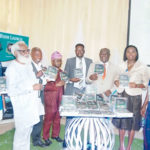WHEN did you take over the directorship of the Alliance Francaise, Ibadan?
I am the new Director of the Alliance Francaise and Centre for French Teaching and Documentation (CFTD) in Ibadan. I arrived in the country last September, but I am not new in Nigeria; I worked at the CFTD in Jos, Plateau State between 1999 and 2001, and later moved to Enugu State, where I worked as the Director of Alliance Francaise there between 2002 and 2003. I later left Nigeria in 2003.
So what did you do when you left Nigeria in 2003?
After I left Nigeria, I worked at two different universities in Ghana. I worked at the University of Cape Coast, where I was for two years, teaching Specific French. I later worked at the Technical University of Kumasi where I was the head of project to develop the school’s French language programme. After Ghana, I went to work at a university in North Korea, where I spent two years. From North Korea, I moved to French Guyana in South America, where I was the head of a team that taught French language to families that are not literate, with the aim of helping those who did not study in school. I was leading about 40 trainers. After French Guyana, I moved to Kinshasa, the Democratic Republic of Congo (DRC), where I was head of a project in a government ministry. After the DRC, I moved to Kenya, where I worked at the French embassy in Nairobi, before returning to Nigeria.
Since you returned to Nigeria, have you noticed any changes between when you were here 20 years ago and now?
With the little period that I am back, I have definitely seen some changes because Nigeria is a big country. When I was in Jos, I had the opportunity to travel round the country and now that I am back, I hope I will be able to see more places. However, I want to say that I am happy to be in Ibadan; this is a part of the country I knew less when I was here 20 years ago.
Being the new Director of the Alliance Francaise, what will be your main focus during your tenure?
It will definitely be to build more partnerships in the teaching and propagation of the French language. We already have about 50 schools that we partner with and we are working to take them through the French language and offer their pupils the DELF certificates. These are pupils in primary and secondary schools. We are also working with colleges of education and universities, especially through the organisation of workshops for French language teachers. We will have a trainer coming from Paris, France, who will work with the French language teachers. This is important because the French language teachers need to be trained and retrained so that they can know how to work with different kinds of students. We will also continue our partnership with the National Association of French Teachers (NAFT), while we will also work together with other Alliance Francaise and three CFTD centres in the country.
French is the second official language of Nigeria, but are you satisfied with the level of its usage on the streets?
It can definitely be better and that is why we are working with French language teachers. The French language is important for Nigeria because the country’s neighbours speak French as their official language, so it is necessary for the citizens to understand and be fluent in the language. French is also a global language and it will open global opportunities for those who can communicate in the language fluently.
Your predecessors supported local artists/artistes through exhibitions, performances, among others, do you plan to continue with this?
We will continue to welcome local artists/artistes; we are already planning for an exhibition and symposium later in the month. We will also have some concerts, and the whole idea is to support local artists/artistes to thrive. Under my leadership, we will have programmes geared towards supporting artists/artistes.
What is the International Day for French Language Teachers all about?
We organised the event to celebrate teachers of the French language. Each year, this event brings together thousands of French language teachers all over the world. Here in Ibadan, we had about 50 teachers with their students. In all, about 20 schools were represented. Participants performed drama, sang and recited poems in the French language, while several prices were given out.
We also organised a competition, Moi Prof de Francaise, where the teachers were invited to introduce themselves and tell us about their work and love for French language in a two-minute video. The next major event gathering French language students and teachers will be in March 2020 during the Francophonie Week.






